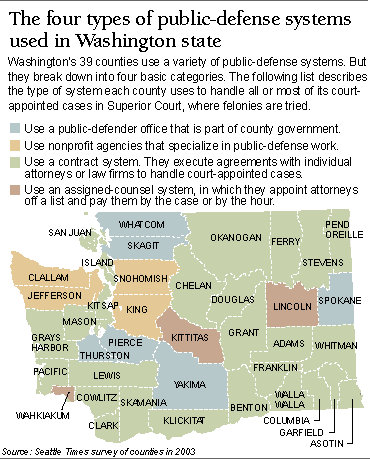 |
 |
 |
|
|
Tuesday, April 6, 2004
Here's how those models work: Public-defender's offices In the six counties that support public-defender's offices, caseloads tend to be lower than in contract systems. But lawyers still battle escalating workloads and limited funding. The advantages are obvious: The lawyers do no other work, so they develop expertise and avoid financial conflict. They get more supervision and support, and often have investigators on staff. One disadvantage is perception. Such public-defender's offices can be seen as one more cog of government, not truly independent from prosecutors, judges and other participants in the criminal-justice system. The Whatcom County Public Defender's Office is fairly typical. Last year, its felony attorneys handled an average of 190 cases each, well above the limit of 150 set by bar guidelines. "We're handling it, but it's a struggle on the serious cases," says Jon Ostlund, who is head of the office. "What we're not managing is the murder cases and the really complicated cases. These things are getting delayed and delayed, because the attorneys and investigators aren't finding time to get to those." The attorneys who handle juvenile and misdemeanor cases also carry caseloads well above standards, Ostlund says. "Unfortunately, certainly in this office — and statewide and nationwide — that's the way it seems to go," he said. "You fund to just below the crisis level." The Spokane County Public Defender's Office has faced similar funding struggles. "I always felt like the bastard at the banquet table," says Richard Cease, who ran the office for more than 20 years. A study of Pierce County's public-defender office shows that, from 1998 to 2003, the workload increased by 40 percent while full-time positions were cut by 14 percent. The results have included excessive caseloads for attorneys, and demands upon legal assistants to do work they're not trained or qualified to handle. The study concluded that the department "is at best treading water," and has "reached a point that may shortly be defined as a crisis. ..." Nonprofit public defense This is a cross between county defender's offices and contract systems. King and three other counties — Snohomish, Jefferson and Clallam — pay nonprofit agencies that specialize in indigent defense. (Snohomish makes an exception in Juvenile Court, where it uses the more-straightforward contract system.) King County, which contracts with four separate nonprofits, has been praised for its system. The Spangenberg Group, a consulting firm that has studied public defense nationwide, four years ago called King County's public-defense services "among the best of the major urban counties across the country." The attorneys are salaried and handle only court-appointed cases. King County puts specific caseload limits and other standards into its contracts with the agencies. Still, administrators and attorneys see room for improvement. Most notably, some of the caseload limits used by King County still exceed those recommended by bar groups. Most Washington counties keep few, if any, caseload statistics for individual public-defense attorneys, making it hard to identify problems. King County is an exception. For example, the Associated Counsel for the Accused — the second-largest of the contract nonprofits in King County — keeps sophisticated caseload statistics for each of its attorneys: how many cases an attorney has, how serious the charges, how long the cases were open, and how resolved. The database allows director Dave Chapman to spot problems. His numbers show, for example, that one attorney was assigned 489 misdemeanor cases in 2002. "That's not acceptable," Chapman says. Chapman works the computer to determine if a lot of those were probation violations, which require less time. He finds only 21, which leaves 468 misdemeanors. A further breakdown of the attorney's work reveals 128 cases of driving under the influence, a particularly demanding charge to defend. The numbers give Chapman evidence of when a public defender is being overworked. "I'm not proud of this," he says of the attorney's caseload. "This is too much work, in my opinion." — Ken Armstrong and Justin Mayo, Seattle Times staff reporters
|
|
||||||||||
seattletimes.com home
Home delivery
| Contact us
| Search archive
| Site map
| Low-graphic
NWclassifieds
| NWsource
| Advertising info
| The Seattle Times Company
